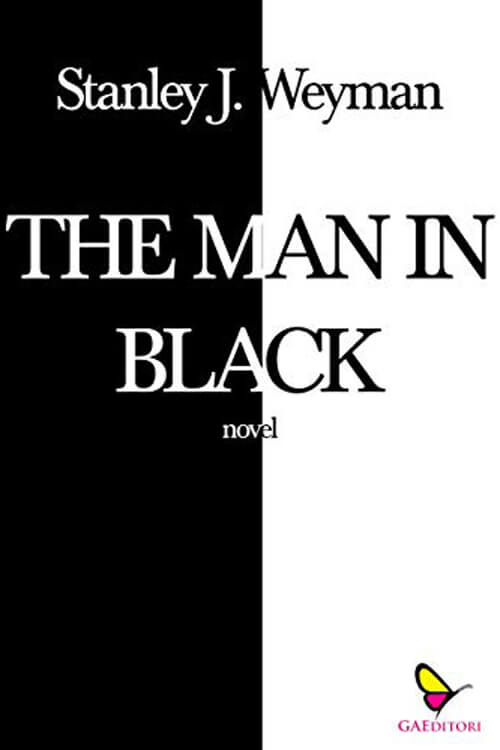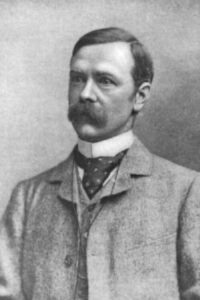
The Man in Black
“I am Jehan de Bault, Seigneur of–I know not where, and Lord of seventeen lordships in the County of—I forget the name, of a most noble and puissant family, possessing the High Justice, the Middle, and the Low. In my veins runs the blood of Roland, and of my forefathers were three marshals of France. I stand here, the—-”
It was the eve of All Saints, and the famous autumn horse fair was in progress at Fécamp–Fécamp on the Normandy coast, the town between the cliffs, which Boisrosé, in the year ’93, snatched for the Great King by a feat of audacity unparalleled in war. This only by the way, however; and that a worthy deed may not die. For at the date of this fair of which we write, the last day of October 1637, stout Captain Boisrosé, whom Sully made for his daring Lieutenant-General of the Ordnance, had long ceased to ruffle it; the Great King had lain in his grave a score of years or more; and though Sully, duke and peer and marshal, still lived, an aged, formal man, in his château of Villebon by Chartres, all France, crouching under the iron hand of the Cardinal, looked other ways.
The great snarled, biting at the hem of the red soutane. But that the mean and Jacques Bonhomme, the merchant, and the trader, flourished under his rule, Fécamp was as good evidence this day as man could desire. Even old burghers who remembered Charles the Ninth, and the first glass windows ever seen in Fécamp outside the Abbey, could not say when the price of horses had been higher or the town more full. All day, and almost all night, the clatter of hoofs and babble of bargains filled the narrow streets; while hucksters’ cries and drunkards’ oaths, with all raucous sounds, went up to heaven like the smoke from a furnace. The Chariot d’Or and the Holy Fig, haunts of those who came to buy, fairly hummed with guests, with nobles of the province and gay sparks from Rouen, army contractors from the Rhine, and dealers from the south. As for the Dame Belle and the Green Man, houses that lower down the street had food and forage for those who came to sell, they strewed their yards a foot deep with straw, and said to all alike, “Voilà, monsieur!” charged the full price of a bed.
Beyond the streets, it was the same. Strings of horses and ponies, with an army of grooms and chaunters, touts and cutpurses, camped on every piece of level ground, while the steeper slopes and hill-sides swarmed with troupes more picturesque, if less useful.
Read or download Book
Stanley J. Weyman
Stanley John Weyman, 7 August 1855 – 10 April 1928) was an English writer of historical romance. His most popular works were written in 1890–1895 and set in late 16th and early 17th-century France. While very successful at the time, they are now largely forgotten.
Biography
Stanley John Weyman was born on 7 August 1855 in Ludlow, Shropshire, the second son of a solicitor. He attended Shrewsbury School and Christ Church, Oxford, leaving in 1877 with a degree in Modern History. After a year’s teaching at the King’s School, Chester, returned to Ludlow in December 1879 to live with his widowed mother.
Weyman was called to the bar in 1881, but had little success as a barrister, as he was shy, nervous, and soft-spoken. However, his shortage of briefs gave him time to write. His short story “King Pippin and Sweet Clive” appeared in the Cornhill Magazine, although its editor, James Payn, himself a novelist, told Weyman it would be easier to make a living writing novels. Weyman viewed himself as a historian and so he was particularly encouraged by positive notices for an article he wrote on Oliver Cromwell that was published in the English Historical Review.
Weyman’s ill-health prompted him in 1885 to spend several months in the South of France with his younger brother Arthur. In December of that year, the brothers were arrested on suspicion of espionage at Aramits. A 24-page critical biography of Weyman published as an annex to an edition of his novel Ovington’s Bank (1922) suggests that this ordeal galvanized the thirty-year-old Weyman, who until then had scraped a meager income writing short stories. His first novel, The House of the Wolf, was published in 1890. Like many of his successful works, it is set in the French religious wars of the late 16th and early 17th centuries.
Weyman became a full-time writer in 1891. Four years later he married Charlotte Panting at Great Fransham, Norfolk, and moved with her to Ruthin in Wales, where they lived for the rest of their lives. Weyman died on 10 April 1928, his wife surviving him by four years; they had no children.
Reputation
Weyman in his day was publicly popular and admired by writers such as Robert Louis Stevenson and Oscar Wilde. In a 1970 BBC interview, Graham Greene said, “The key books in my life included Anthony Hope, Rider Haggard, Captain Gilson and I do occasionally re-read them. Stanley Weyman in particular.” Works like The Three Musketeers by Alexandre Dumas had established a market for popular historical fiction and it was a crowded field. Contemporary rivals included Baroness Orczy, A. E. W. Mason, John Buchan, and Rafael Sabatini.
The biographer Reginald Pound grouped Weyman with Arnold Bennett, Anthony Hope, Aldous Huxley, Dorothy L. Sayers, and Somerset Maugham as Strand writers. He is now perhaps the least familiar of all these. His greatest success came before 1895 (Under the Red Robe, A Gentleman of France and The Red Cockade) and he stopped writing entirely between 1908 and 1919. His style and focus are more typical of Victorian writers, as are his faults. With odd exceptions such as Gil de Berault in Under the Red Robe, his characters are fairly uniform, his women’s caricatures, and his dialogue wooden to modern ears.
Weyman’s strength lies in historical detail, often in less familiar areas. The Long Night is based on the Duke of Savoy’s attempt to storm Geneva in December 1602, an event still celebrated annually in a festival called L’Escalade. Weyman received an award from the city for his research. The financial security of early success allowed him to choose subjects of personal interest. Some had less general appeal, such as the 1832 Reform Bill (treated in Chippinge), post-1815 industrialization (Scarecrow Farm), or the 1825 financial crisis (Ovington’s Bank, reprinted in 2012 and 2015 on the back of a similar crisis in 2008).
Weyman called his books “pleasant fables” and was aware of their modest literary value.






